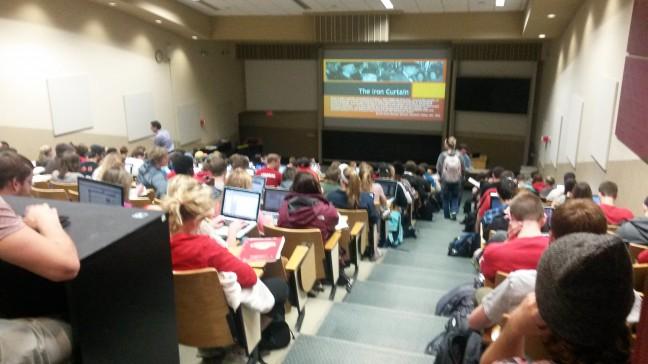The instructor writes on the board and poses an open-ended question to the assembled students. No one moves, no one reacts and no one feels the need to speak. He nearly wakes a sleeping student, but the question, rendered rhetorical, was not enough.
The class isn’t worth the instructor or students’ time — but at least every seat is filled.
Students attend these classes as a result of instructors’ authoritarian attendance policies, which often dock students’ grades as punishment for absences.
For example: Discussion sections for a 400-seat introductory gender studies course allow one “free” absence before docking the semester grade two percentage points for each subsequent no-show. An intermediate level journalism course allows two absences before a student’s semester grade falls half a letter grade with each absence.
While some might celebrate these instructors as guardians of valuable tuition dollars, these policies are instead fostering a culture of apathy and disengagement. Students learn they can physically show up to class to receive their attendance gold star for the day without any assurance they’ll arrive prepared or even remotely interested in substantive academic discussions.
There’s a large body of academic research about how best to motivate students’ learning. While there seems to be a high correlation between attendance and academic achievement, there is little research about whether these high-achieving students actually took away any skills or different ways of looking at the world.
A better predictor of students actively engaging with course material is the degree of their intrinsic motivation. It’s this internalized drive that will encourage students to continue interrogating popular claims and thinking critically long after they receive a degree, not the number of times they passively attended a discussion section.
College is lauded as a critical time of transition to the self-reliance of adulthood. So it’s counterintuitive to chart attendance in the same way students have grown accustomed to since their first day of kindergarten. The practice is paternalistic and diminutive. Instead of allowing students the freedom to attend class of their own accord, assigning an extrinsic reward — a grade for attending class — only succeeds in incentivizing a physical presence in a classroom.
Encouraging real learning remains a much more different task, one that isn’t served by calling the roll. The more unyielding an attendance policy is, the more likely students are to grow to resent the policy, the course or the professor.
Assigning an arbitrary reward for simply showing up does nothing to encourage students to delve into their coursework. A study by John Condry and James Chambers found students who are internally motivated to succeed are more strategic and logical when approaching a complex problem. In stark contrast, students motivated by an external reward are more likely to expend only the minimal amount of effort required to receive that reward — like getting out of bed and walking to class in exchange for academic credit.
Other studies have found instructors’ use of externally-based rewards can also actively undermine a student’s natural motivation. When everyone gets two points just for showing up, what’s the point of being among the one or two students who arrive prepared for class?
By distilling the value of higher education down to small, measured doses of reinforcement, instructors debase the power of their courses to be impactful and meaningful experiences. Rather than authoritatively demanding students attend class come hell or high water, instructors should champion those who arrive and prepare of their own accord because credit is rarely awarded for simply showing up after you leave the university’s hallowed halls.
Katherine Krueger (kkrueger





















